Ethical Analysis: Business Integrity in ShellBp Company Operations
VerifiedAdded on 2023/05/30
|6
|1386
|183
Essay
AI Summary
This essay provides a comprehensive analysis of ShellBp's business integrity, focusing on the company's ethical conduct and corporate social responsibility initiatives. While ShellBp promotes itself as a leader in cleaner energy and environmentally conscious oil exploration, the essay highlights instances of non-conformity and bribery allegations, particularly in developing countries. The essay explores the company's involvement in graft practices, tax evasion charges, and its response to corruption claims. Despite ShellBp's efforts in corporate social responsibility, the essay concludes that the company needs to revisit its code of conduct, implement stringent measures against unethical behavior, and prioritize transparency to restore stakeholder trust and attract investors. Desklib provides similar essays and solved assignments for students.
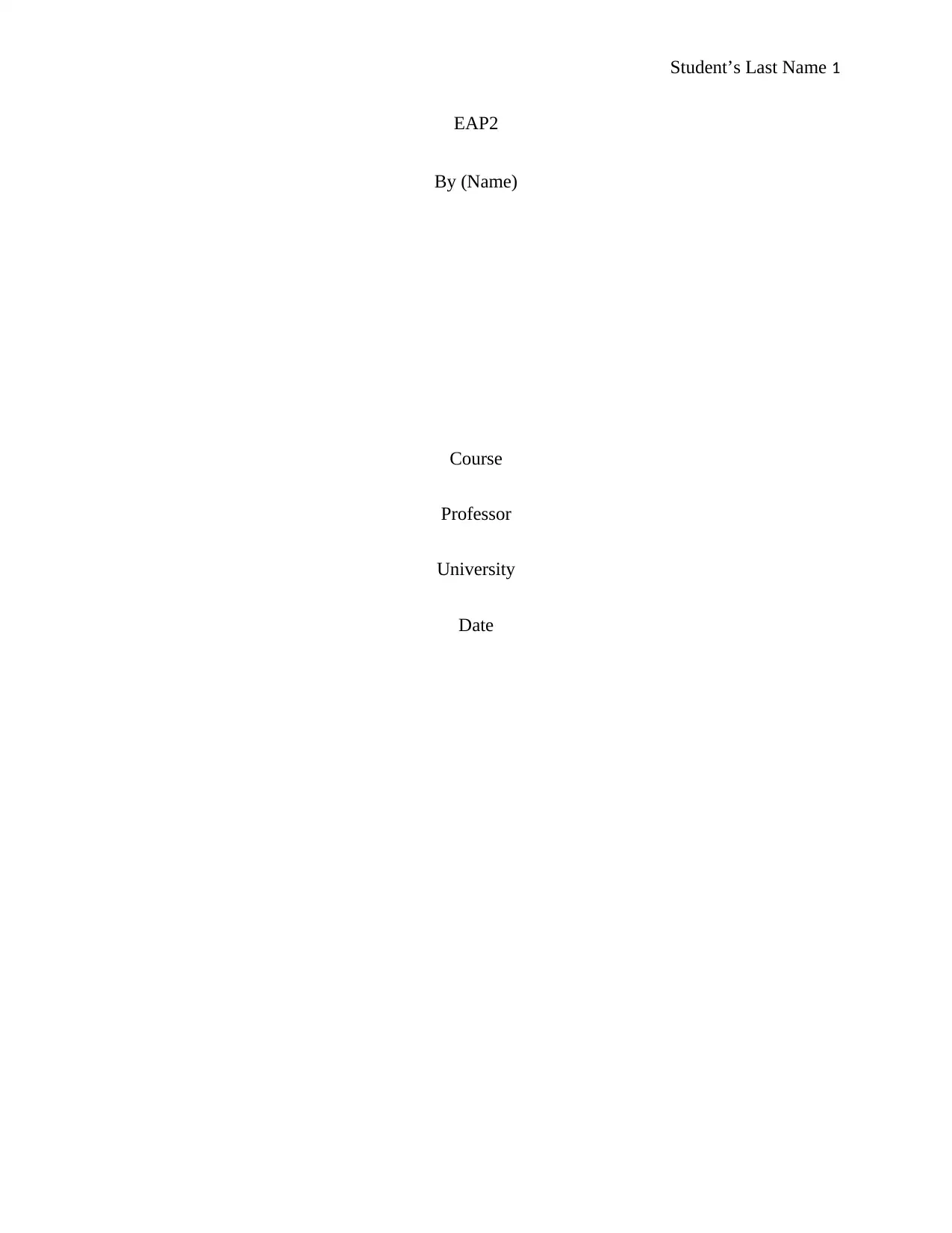
Student’s Last Name 1
EAP2
By (Name)
Course
Professor
University
Date
EAP2
By (Name)
Course
Professor
University
Date
Paraphrase This Document
Need a fresh take? Get an instant paraphrase of this document with our AI Paraphraser
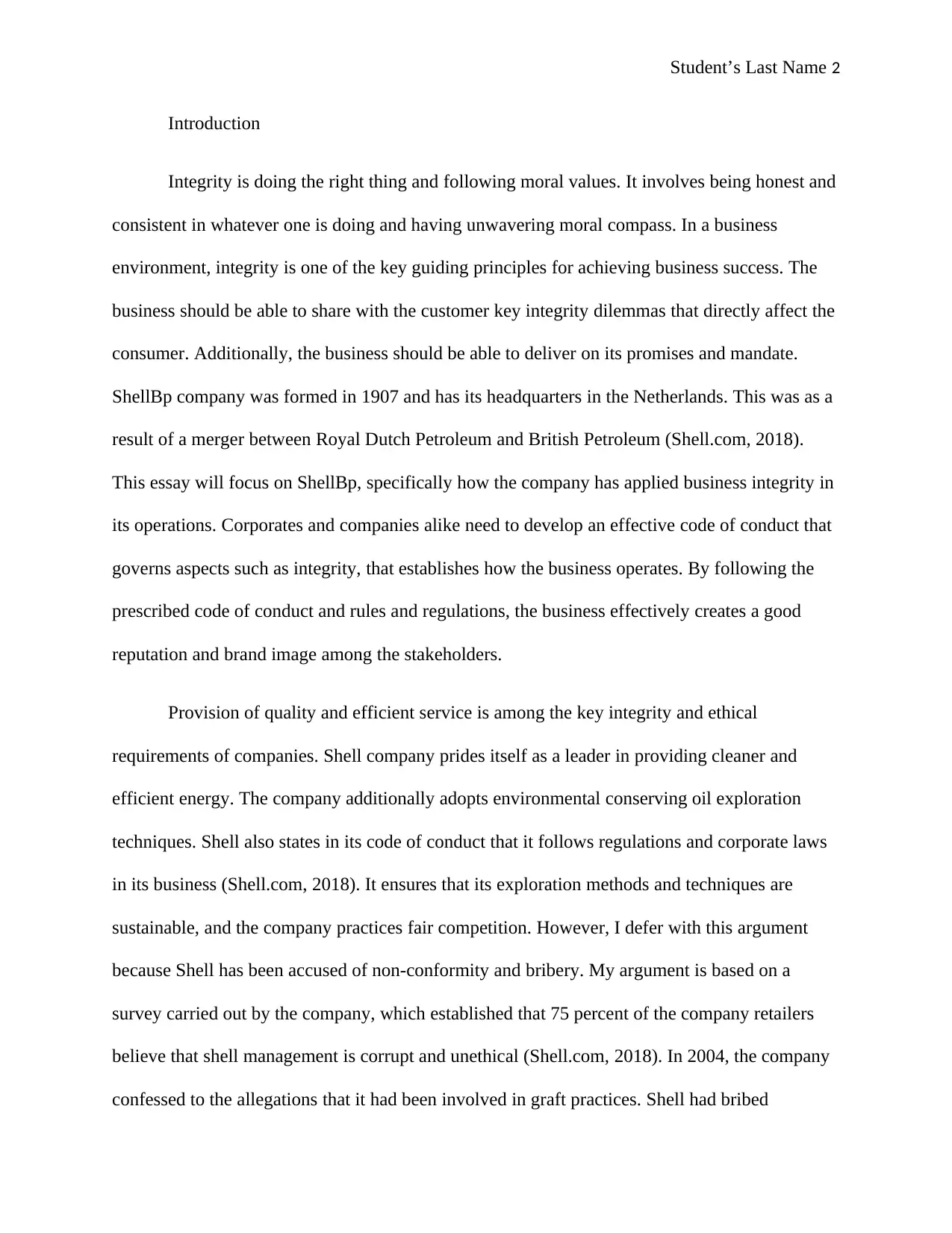
Student’s Last Name 2
Introduction
Integrity is doing the right thing and following moral values. It involves being honest and
consistent in whatever one is doing and having unwavering moral compass. In a business
environment, integrity is one of the key guiding principles for achieving business success. The
business should be able to share with the customer key integrity dilemmas that directly affect the
consumer. Additionally, the business should be able to deliver on its promises and mandate.
ShellBp company was formed in 1907 and has its headquarters in the Netherlands. This was as a
result of a merger between Royal Dutch Petroleum and British Petroleum (Shell.com, 2018).
This essay will focus on ShellBp, specifically how the company has applied business integrity in
its operations. Corporates and companies alike need to develop an effective code of conduct that
governs aspects such as integrity, that establishes how the business operates. By following the
prescribed code of conduct and rules and regulations, the business effectively creates a good
reputation and brand image among the stakeholders.
Provision of quality and efficient service is among the key integrity and ethical
requirements of companies. Shell company prides itself as a leader in providing cleaner and
efficient energy. The company additionally adopts environmental conserving oil exploration
techniques. Shell also states in its code of conduct that it follows regulations and corporate laws
in its business (Shell.com, 2018). It ensures that its exploration methods and techniques are
sustainable, and the company practices fair competition. However, I defer with this argument
because Shell has been accused of non-conformity and bribery. My argument is based on a
survey carried out by the company, which established that 75 percent of the company retailers
believe that shell management is corrupt and unethical (Shell.com, 2018). In 2004, the company
confessed to the allegations that it had been involved in graft practices. Shell had bribed
Introduction
Integrity is doing the right thing and following moral values. It involves being honest and
consistent in whatever one is doing and having unwavering moral compass. In a business
environment, integrity is one of the key guiding principles for achieving business success. The
business should be able to share with the customer key integrity dilemmas that directly affect the
consumer. Additionally, the business should be able to deliver on its promises and mandate.
ShellBp company was formed in 1907 and has its headquarters in the Netherlands. This was as a
result of a merger between Royal Dutch Petroleum and British Petroleum (Shell.com, 2018).
This essay will focus on ShellBp, specifically how the company has applied business integrity in
its operations. Corporates and companies alike need to develop an effective code of conduct that
governs aspects such as integrity, that establishes how the business operates. By following the
prescribed code of conduct and rules and regulations, the business effectively creates a good
reputation and brand image among the stakeholders.
Provision of quality and efficient service is among the key integrity and ethical
requirements of companies. Shell company prides itself as a leader in providing cleaner and
efficient energy. The company additionally adopts environmental conserving oil exploration
techniques. Shell also states in its code of conduct that it follows regulations and corporate laws
in its business (Shell.com, 2018). It ensures that its exploration methods and techniques are
sustainable, and the company practices fair competition. However, I defer with this argument
because Shell has been accused of non-conformity and bribery. My argument is based on a
survey carried out by the company, which established that 75 percent of the company retailers
believe that shell management is corrupt and unethical (Shell.com, 2018). In 2004, the company
confessed to the allegations that it had been involved in graft practices. Shell had bribed
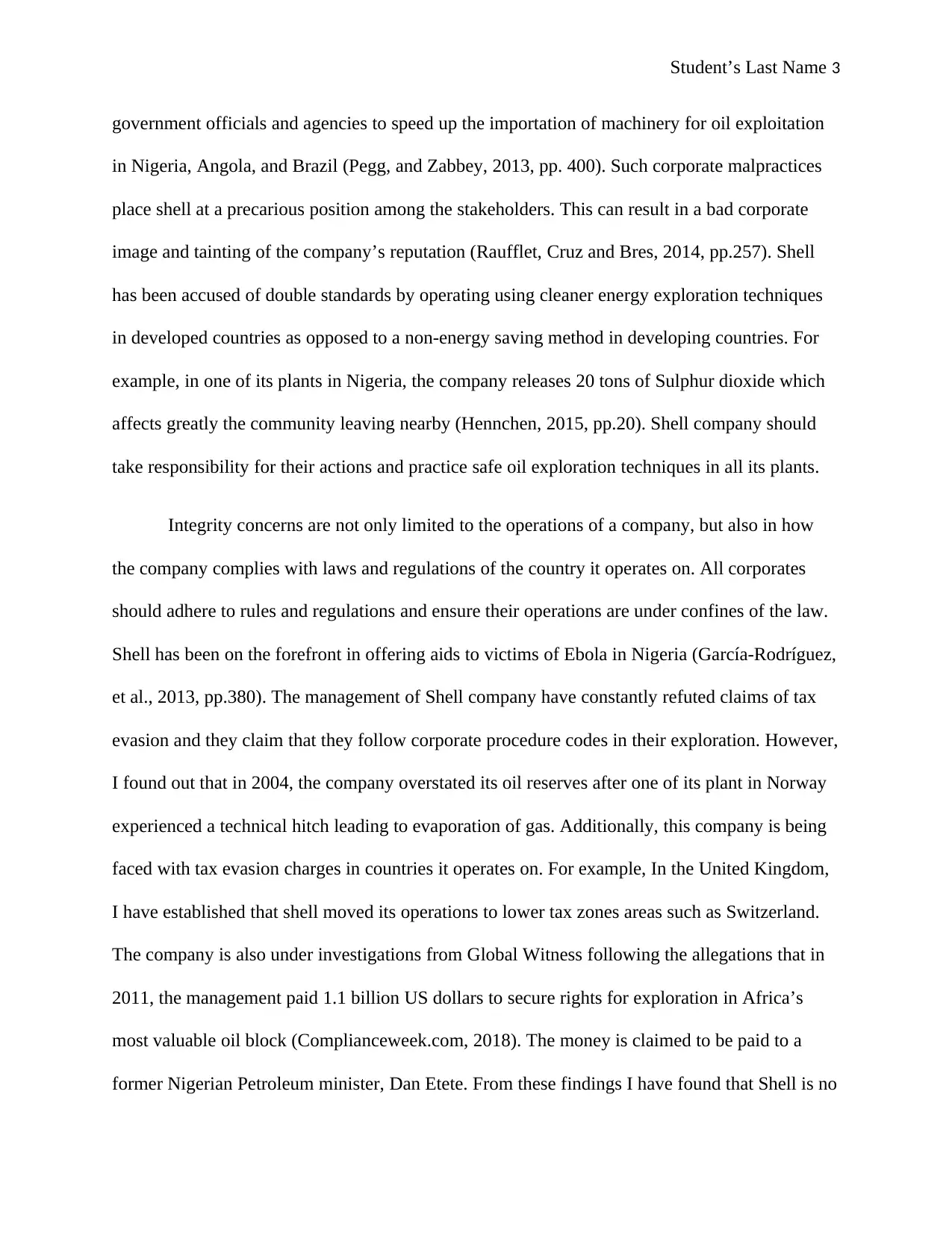
Student’s Last Name 3
government officials and agencies to speed up the importation of machinery for oil exploitation
in Nigeria, Angola, and Brazil (Pegg, and Zabbey, 2013, pp. 400). Such corporate malpractices
place shell at a precarious position among the stakeholders. This can result in a bad corporate
image and tainting of the company’s reputation (Raufflet, Cruz and Bres, 2014, pp.257). Shell
has been accused of double standards by operating using cleaner energy exploration techniques
in developed countries as opposed to a non-energy saving method in developing countries. For
example, in one of its plants in Nigeria, the company releases 20 tons of Sulphur dioxide which
affects greatly the community leaving nearby (Hennchen, 2015, pp.20). Shell company should
take responsibility for their actions and practice safe oil exploration techniques in all its plants.
Integrity concerns are not only limited to the operations of a company, but also in how
the company complies with laws and regulations of the country it operates on. All corporates
should adhere to rules and regulations and ensure their operations are under confines of the law.
Shell has been on the forefront in offering aids to victims of Ebola in Nigeria (García‐Rodríguez,
et al., 2013, pp.380). The management of Shell company have constantly refuted claims of tax
evasion and they claim that they follow corporate procedure codes in their exploration. However,
I found out that in 2004, the company overstated its oil reserves after one of its plant in Norway
experienced a technical hitch leading to evaporation of gas. Additionally, this company is being
faced with tax evasion charges in countries it operates on. For example, In the United Kingdom,
I have established that shell moved its operations to lower tax zones areas such as Switzerland.
The company is also under investigations from Global Witness following the allegations that in
2011, the management paid 1.1 billion US dollars to secure rights for exploration in Africa’s
most valuable oil block (Complianceweek.com, 2018). The money is claimed to be paid to a
former Nigerian Petroleum minister, Dan Etete. From these findings I have found that Shell is no
government officials and agencies to speed up the importation of machinery for oil exploitation
in Nigeria, Angola, and Brazil (Pegg, and Zabbey, 2013, pp. 400). Such corporate malpractices
place shell at a precarious position among the stakeholders. This can result in a bad corporate
image and tainting of the company’s reputation (Raufflet, Cruz and Bres, 2014, pp.257). Shell
has been accused of double standards by operating using cleaner energy exploration techniques
in developed countries as opposed to a non-energy saving method in developing countries. For
example, in one of its plants in Nigeria, the company releases 20 tons of Sulphur dioxide which
affects greatly the community leaving nearby (Hennchen, 2015, pp.20). Shell company should
take responsibility for their actions and practice safe oil exploration techniques in all its plants.
Integrity concerns are not only limited to the operations of a company, but also in how
the company complies with laws and regulations of the country it operates on. All corporates
should adhere to rules and regulations and ensure their operations are under confines of the law.
Shell has been on the forefront in offering aids to victims of Ebola in Nigeria (García‐Rodríguez,
et al., 2013, pp.380). The management of Shell company have constantly refuted claims of tax
evasion and they claim that they follow corporate procedure codes in their exploration. However,
I found out that in 2004, the company overstated its oil reserves after one of its plant in Norway
experienced a technical hitch leading to evaporation of gas. Additionally, this company is being
faced with tax evasion charges in countries it operates on. For example, In the United Kingdom,
I have established that shell moved its operations to lower tax zones areas such as Switzerland.
The company is also under investigations from Global Witness following the allegations that in
2011, the management paid 1.1 billion US dollars to secure rights for exploration in Africa’s
most valuable oil block (Complianceweek.com, 2018). The money is claimed to be paid to a
former Nigerian Petroleum minister, Dan Etete. From these findings I have found that Shell is no
⊘ This is a preview!⊘
Do you want full access?
Subscribe today to unlock all pages.

Trusted by 1+ million students worldwide
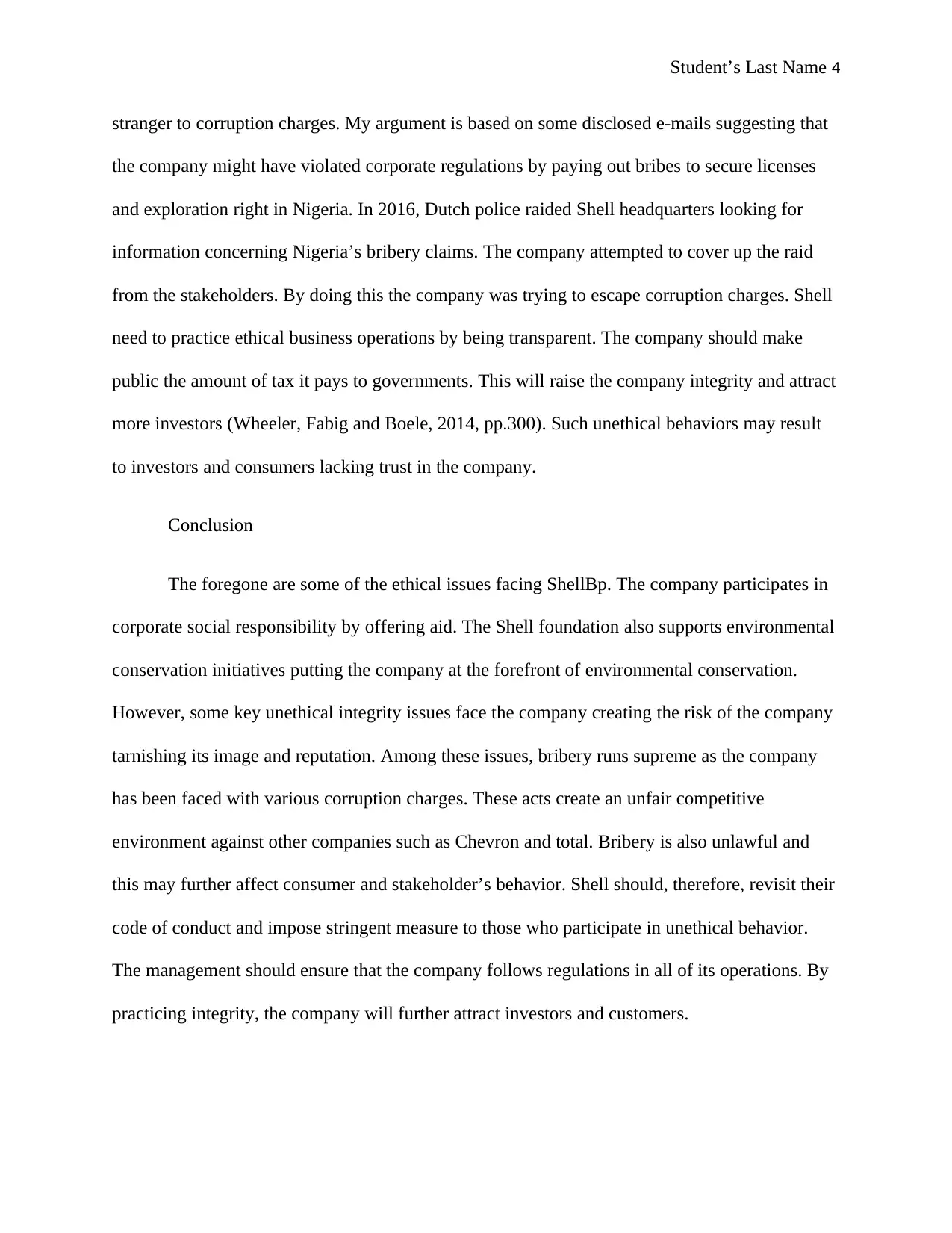
Student’s Last Name 4
stranger to corruption charges. My argument is based on some disclosed e-mails suggesting that
the company might have violated corporate regulations by paying out bribes to secure licenses
and exploration right in Nigeria. In 2016, Dutch police raided Shell headquarters looking for
information concerning Nigeria’s bribery claims. The company attempted to cover up the raid
from the stakeholders. By doing this the company was trying to escape corruption charges. Shell
need to practice ethical business operations by being transparent. The company should make
public the amount of tax it pays to governments. This will raise the company integrity and attract
more investors (Wheeler, Fabig and Boele, 2014, pp.300). Such unethical behaviors may result
to investors and consumers lacking trust in the company.
Conclusion
The foregone are some of the ethical issues facing ShellBp. The company participates in
corporate social responsibility by offering aid. The Shell foundation also supports environmental
conservation initiatives putting the company at the forefront of environmental conservation.
However, some key unethical integrity issues face the company creating the risk of the company
tarnishing its image and reputation. Among these issues, bribery runs supreme as the company
has been faced with various corruption charges. These acts create an unfair competitive
environment against other companies such as Chevron and total. Bribery is also unlawful and
this may further affect consumer and stakeholder’s behavior. Shell should, therefore, revisit their
code of conduct and impose stringent measure to those who participate in unethical behavior.
The management should ensure that the company follows regulations in all of its operations. By
practicing integrity, the company will further attract investors and customers.
stranger to corruption charges. My argument is based on some disclosed e-mails suggesting that
the company might have violated corporate regulations by paying out bribes to secure licenses
and exploration right in Nigeria. In 2016, Dutch police raided Shell headquarters looking for
information concerning Nigeria’s bribery claims. The company attempted to cover up the raid
from the stakeholders. By doing this the company was trying to escape corruption charges. Shell
need to practice ethical business operations by being transparent. The company should make
public the amount of tax it pays to governments. This will raise the company integrity and attract
more investors (Wheeler, Fabig and Boele, 2014, pp.300). Such unethical behaviors may result
to investors and consumers lacking trust in the company.
Conclusion
The foregone are some of the ethical issues facing ShellBp. The company participates in
corporate social responsibility by offering aid. The Shell foundation also supports environmental
conservation initiatives putting the company at the forefront of environmental conservation.
However, some key unethical integrity issues face the company creating the risk of the company
tarnishing its image and reputation. Among these issues, bribery runs supreme as the company
has been faced with various corruption charges. These acts create an unfair competitive
environment against other companies such as Chevron and total. Bribery is also unlawful and
this may further affect consumer and stakeholder’s behavior. Shell should, therefore, revisit their
code of conduct and impose stringent measure to those who participate in unethical behavior.
The management should ensure that the company follows regulations in all of its operations. By
practicing integrity, the company will further attract investors and customers.
Paraphrase This Document
Need a fresh take? Get an instant paraphrase of this document with our AI Paraphraser
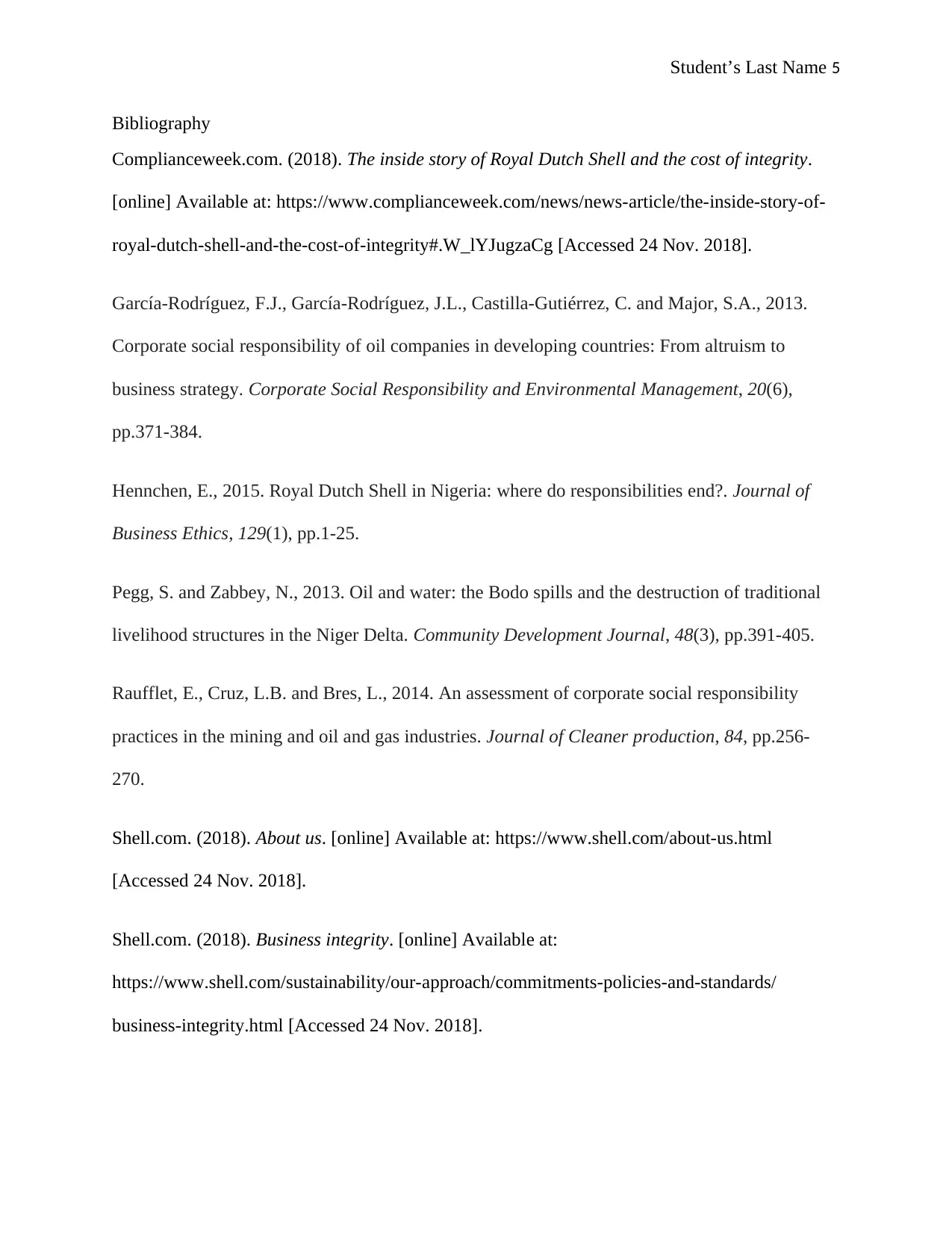
Student’s Last Name 5
Bibliography
Complianceweek.com. (2018). The inside story of Royal Dutch Shell and the cost of integrity.
[online] Available at: https://www.complianceweek.com/news/news-article/the-inside-story-of-
royal-dutch-shell-and-the-cost-of-integrity#.W_lYJugzaCg [Accessed 24 Nov. 2018].
García‐Rodríguez, F.J., García‐Rodríguez, J.L., Castilla‐Gutiérrez, C. and Major, S.A., 2013.
Corporate social responsibility of oil companies in developing countries: From altruism to
business strategy. Corporate Social Responsibility and Environmental Management, 20(6),
pp.371-384.
Hennchen, E., 2015. Royal Dutch Shell in Nigeria: where do responsibilities end?. Journal of
Business Ethics, 129(1), pp.1-25.
Pegg, S. and Zabbey, N., 2013. Oil and water: the Bodo spills and the destruction of traditional
livelihood structures in the Niger Delta. Community Development Journal, 48(3), pp.391-405.
Raufflet, E., Cruz, L.B. and Bres, L., 2014. An assessment of corporate social responsibility
practices in the mining and oil and gas industries. Journal of Cleaner production, 84, pp.256-
270.
Shell.com. (2018). About us. [online] Available at: https://www.shell.com/about-us.html
[Accessed 24 Nov. 2018].
Shell.com. (2018). Business integrity. [online] Available at:
https://www.shell.com/sustainability/our-approach/commitments-policies-and-standards/
business-integrity.html [Accessed 24 Nov. 2018].
Bibliography
Complianceweek.com. (2018). The inside story of Royal Dutch Shell and the cost of integrity.
[online] Available at: https://www.complianceweek.com/news/news-article/the-inside-story-of-
royal-dutch-shell-and-the-cost-of-integrity#.W_lYJugzaCg [Accessed 24 Nov. 2018].
García‐Rodríguez, F.J., García‐Rodríguez, J.L., Castilla‐Gutiérrez, C. and Major, S.A., 2013.
Corporate social responsibility of oil companies in developing countries: From altruism to
business strategy. Corporate Social Responsibility and Environmental Management, 20(6),
pp.371-384.
Hennchen, E., 2015. Royal Dutch Shell in Nigeria: where do responsibilities end?. Journal of
Business Ethics, 129(1), pp.1-25.
Pegg, S. and Zabbey, N., 2013. Oil and water: the Bodo spills and the destruction of traditional
livelihood structures in the Niger Delta. Community Development Journal, 48(3), pp.391-405.
Raufflet, E., Cruz, L.B. and Bres, L., 2014. An assessment of corporate social responsibility
practices in the mining and oil and gas industries. Journal of Cleaner production, 84, pp.256-
270.
Shell.com. (2018). About us. [online] Available at: https://www.shell.com/about-us.html
[Accessed 24 Nov. 2018].
Shell.com. (2018). Business integrity. [online] Available at:
https://www.shell.com/sustainability/our-approach/commitments-policies-and-standards/
business-integrity.html [Accessed 24 Nov. 2018].
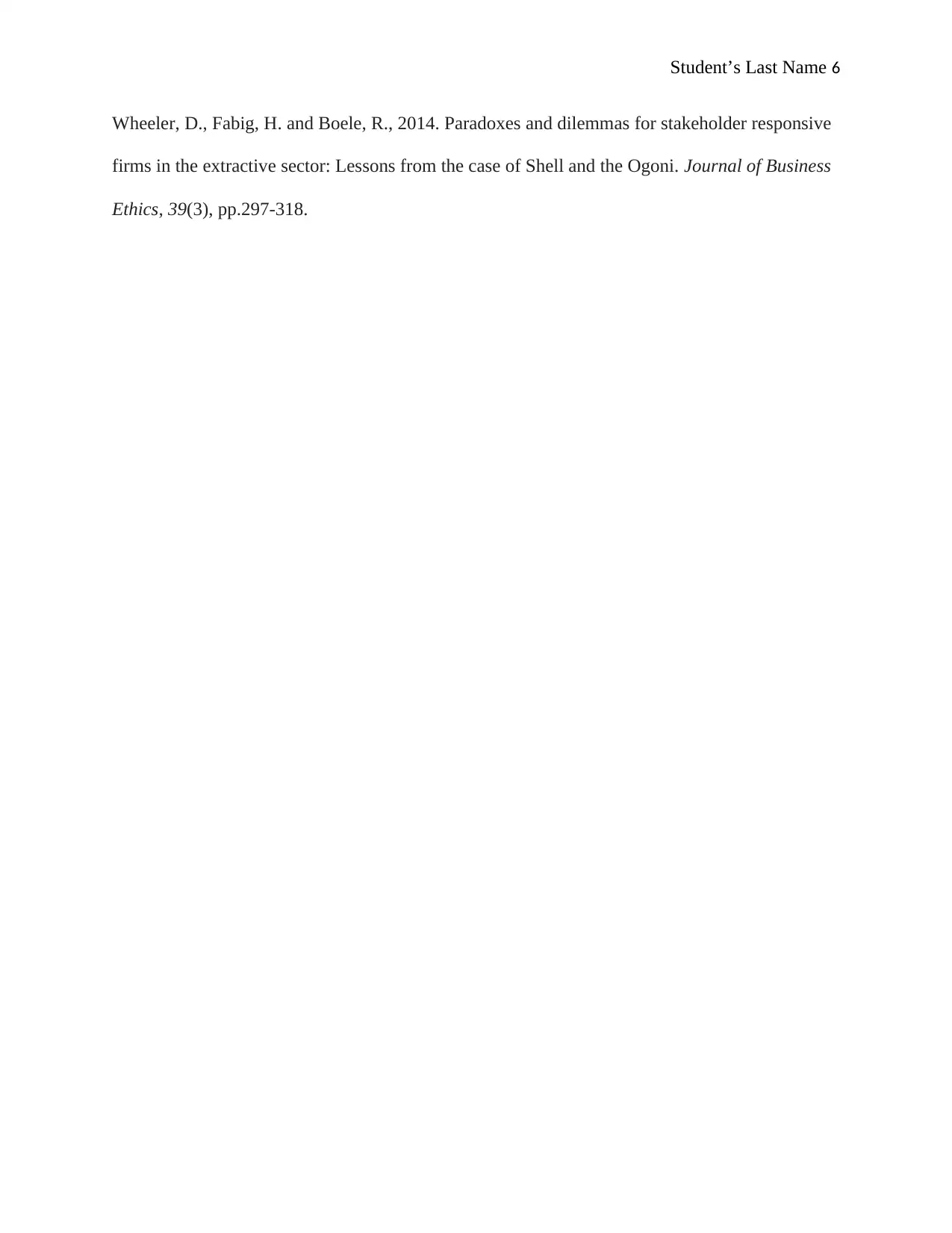
Student’s Last Name 6
Wheeler, D., Fabig, H. and Boele, R., 2014. Paradoxes and dilemmas for stakeholder responsive
firms in the extractive sector: Lessons from the case of Shell and the Ogoni. Journal of Business
Ethics, 39(3), pp.297-318.
Wheeler, D., Fabig, H. and Boele, R., 2014. Paradoxes and dilemmas for stakeholder responsive
firms in the extractive sector: Lessons from the case of Shell and the Ogoni. Journal of Business
Ethics, 39(3), pp.297-318.
⊘ This is a preview!⊘
Do you want full access?
Subscribe today to unlock all pages.

Trusted by 1+ million students worldwide
1 out of 6
Related Documents
Your All-in-One AI-Powered Toolkit for Academic Success.
+13062052269
info@desklib.com
Available 24*7 on WhatsApp / Email
![[object Object]](/_next/static/media/star-bottom.7253800d.svg)
Unlock your academic potential
Copyright © 2020–2026 A2Z Services. All Rights Reserved. Developed and managed by ZUCOL.





